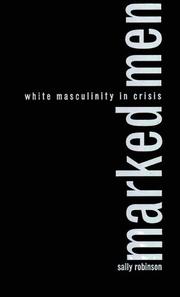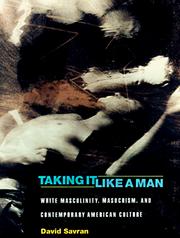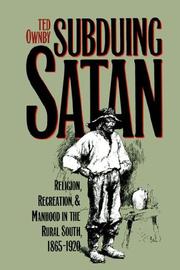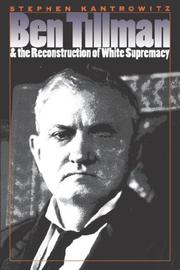| Listing 1 - 10 of 20 | << page >> |
Sort by
|

ISBN: 1282904434 9786612904431 0822382148 0822321300 0822321491 Year: 1998 Publisher: Durham : Duke University Press,
Abstract | Keywords | Export | Availability | Bookmark
 Loading...
Loading...Choose an application
- Reference Manager
- EndNote
- RefWorks (Direct export to RefWorks)
How white manhood comes to stand for the nation in the nineteenth-century U.S.
Men, White --- Middle class men --- Men --- Masculinity --- Racism --- Sexism --- Human males --- Human beings --- Males --- Effeminacy --- White men --- Psychology. --- Attitudes. --- Identity.
Dissertation
Abstract | Keywords | Export | Availability | Bookmark
 Loading...
Loading...Choose an application
- Reference Manager
- EndNote
- RefWorks (Direct export to RefWorks)
Doelstelling: De doelstelling van deze scriptie is tweeledig: Ten eerste een vertaling in het Nederlands maken van twee geselecteerde passages uit Stupid White Men van Michael Moore voor een Vlaams en Nederlands doelpubliek. Bij deze vertaling wordt uitgegaan van de vraag: "Hoe zou Michael Moore dit uitleggen aan het doelpubliek?" Ten tweede, twee onderwerpen bespreken in het commentaargedeelte: aan de ene kant de vertaling van culturele referenties en aan de andere kant de aanpak van informele taal in vertaling. Deze twee onderwerpen zijn gekozen omdat ze belangrijk zijn in de brontekst en vertaalproblemen kunnen veroorzaken. Middelen of methode: Aan de hand van een theoretische omkadering gebaseerd op de werken van verschillende specialisten op het vlak van culturele referenties, worden in een case study mijn vertaalkeuzes besproken en vergeleken met de vertaalkeuzes in de gepubliceerde vertaling. Internet, woordenboeken en de archieven van De Standaard en De Morgen zijn de voornaamste bronnen voor deze case study. Om het register te bespreken wordt eerst een korte theoretische toelichting gegeven bij de relevante termen, gevolgd door een analyse van hoe de informaliteit in mijn vertaling en de gepubliceerde vertaling is weergegeven. De belangrijkste bronnen voor deze case study zijn gespecialiseerde verklarende woordenboeken. Resultaten: Het was voor mij een uitdaging om bij de vertaling zo veel mogelijk van de Amerikaanse cultuur en informaliteit te behouden, maar toch een correcte, duidelijke Nederlandse tekst te produceren. Uit de vergelijking met de gepubliceerde vertaling blijkt dat in de gepubliceerde vertaling minder van de Amerikaanse cultuur en informaliteit behouden is. De bespreking van de theorie in verband met culturele referenties geeft een goede basis om een vertaling als deze te maken, maar in de praktijk is het nog steeds elke keer zoeken welke techniek het meest geschikt is voor iedere culturele referentie. De bespreking van het register toont aan dat het niet evident is informaliteit in een Nederlandse tekst te behouden.
Culturele referenties. --- Informele taal. --- Michael Moore. --- Register. --- Stupid White Men. --- Verenigde Staten. --- Vergelijkende commentaar. --- Vertaling met commentaar.
Book
ISBN: 1282639102 9786612639104 0472026607 047205080X 0472070800 9780472026609 0472900455 9780472900459 9781282639102 6612639105 9780472070800 9780472050802 Year: 2010 Publisher: Ann Arbor : The University of Michigan Press : The University of Michigan Library,
Abstract | Keywords | Export | Availability | Bookmark
 Loading...
Loading...Choose an application
- Reference Manager
- EndNote
- RefWorks (Direct export to RefWorks)
"Intellectually deft and lively to read, Skate Life is an important addition to the literature on youth cultures, contemporary masculinity, and the role of media in identity formation." ---Janice A. Radway, Northwestern University, author of Reading the Romance: Women, Patriarchy, and Popular Literature "With her elegant research design and sophisticated array of anthropological and media studies approaches, Emily Chivers Yochim has produced one of the best books about race, gender, and class that I have read in the last ten years. In a moment where celebratory studies of youth, youth subcultures, and their relationship to media abound, this book stands as a brilliantly argued analysis of the limitations of youth subcultures and their ambiguous relationship to mainstream commercial culture." ---Ellen Seiter, University of Southern California "Yochim has made a valuable contribution to media and cultural studies as well as youth and American studies by conducting this research and by coining the phrase 'corresponding cultures,' which conceptualizes the complex and dynamic processes skateboarders employ to negotiate their identities as part of both mainstream and counter-cultures." ---JoEllen Fisherkeller, New York University Skate Life examines how young male skateboarders use skate culture media in the production of their identities. Emily Chivers Yochim offers a comprehensive ethnographic analysis of an Ann Arbor, Michigan, skateboarding community, situating it within a larger historical examination of skateboarding's portrayal in mainstream media and a critique of mainstream, niche, and locally produced media texts (such as, for example, Jackass, Viva La Bam, and Dogtown and Z-Boys). The book uses these elements to argue that adolescent boys can both critique dominant norms of masculinity and maintain the power that white heterosexual masculinity offers. Additionally, Yochim uses these analyses to introduce the notion of "corresponding cultures," conceptualizing the ways in which media audiences both argue with and incorporate mediated images into their own ideas about identity. In a strong combination of anthropological and media studies approaches, Skate Life asks important questions of the literature on youth and provides new ways of assessing how young people create their identities. Emily Chivers Yochim is Assistant Professor in the Department of Communication Arts, Allegheny College. Cover design by Brian V. Smith.
Skateboarding --- Masculinity in sports. --- Men, White --- Masculinity in sports --- Social Sciences --- Recreation & Sports --- Social aspects. --- Attitudes. --- Social aspects --- Attitudes --- White men --- Sports --- Roller skating

ISBN: 1501729292 9781501729294 0801444675 0801472865 9780801444678 9780801472862 Year: 2018 Publisher: Ithaca, NY
Abstract | Keywords | Export | Availability | Bookmark
 Loading...
Loading...Choose an application
- Reference Manager
- EndNote
- RefWorks (Direct export to RefWorks)
Kris Paap worked for nearly three years as a carpenter's apprentice on a variety of jobsites, closely observing her colleagues' habits, expressions, and attitudes. As a woman in an overwhelmingly male-and stereotypically "macho"-profession, Paap uses her experiences to reveal the ways that gender, class, and race interact in the construction industry. She shows how the stereotypes of construction workers and their overt displays of sexism, racism, physical strength, and homophobia are not "just how they are," but rather culturally and structurally mandated enactments of what it means to be a man-and a worker-in America.The significance of these worker performances is particularly clear in relation to occupational safety: when the pressures for demonstrating physical masculinity are combined with a lack of protection from firing, workers are forced to ignore safety procedures in order to prove-whether male or female-that they are "man enough" to do the job. Thus these mandated performances have real, and sometimes deadly, consequences for individuals, the entire working class, and the strength of the union movement.Paap concludes that machismo separates the white male construction workers from their natural political allies, increases their risks on the job, plays to management's interests, lowers their overall social status, and undercuts the effectiveness of their union.
Construction industry --- Masculinity --- Men, White --- Working class men --- Construction workers --- White men --- Men --- Building industry --- Home building industry --- Building --- Safety measures. --- Attitudes. --- Employees

ISBN: 0231112920 9780231112925 0231112939 9780231112932 023150036X Year: 2000 Publisher: New York, NY : Columbia University Press,
Abstract | Keywords | Export | Availability | Bookmark
 Loading...
Loading...Choose an application
- Reference Manager
- EndNote
- RefWorks (Direct export to RefWorks)
White men still hold most of the political and economic cards in the United States; yet stories about wounded and traumatized men dominate popular culture. Why are white men jumping on the victim bandwagon? Examining novels by Philip Roth, John Updike, James Dickey, John Irving, and Pat Conroy and such films as Deliverance, Misery, and Dead Poets Society-as well as other writings, including The Closing of the American Mind-Sally Robinson argues that white men are tempted by the possibilities of pain and the surprisingly pleasurable tensions that come from living in crisis.
Psychological study of literature --- Thematology --- Sociology of culture --- United States --- Men, White --- Masculinity --- Men in popular culture --- Men in literature. --- Blancs --- Masculinité --- Hommes dans la culture populaire --- Hommes dans la littérature. --- Masculinity. --- Men in popular culture. --- Men, White. --- United States. --- White men. --- Gender & Ethnic Studies --- Social Sciences --- Gender Studies & Sexuality --- United States of America

ISBN: 0691058768 0691016372 9786612753367 1400813271 1400822467 1282753363 9781400822461 9781400813278 9780691058764 9780691016375 9781282753365 6612753366 140080700X Year: 1998 Publisher: Princeton, NJ
Abstract | Keywords | Export | Availability | Bookmark
 Loading...
Loading...Choose an application
- Reference Manager
- EndNote
- RefWorks (Direct export to RefWorks)
From the Beat poets' incarnation of the "white Negro" through Iron John and the Men's Movement to the paranoid masculinity of Timothy McVeigh, white men in this country have increasingly imagined themselves as victims. In Taking It Like a Man, David Savran explores the social and sexual tensions that have helped to produce this phenomenon. Beginning with the 1940's, when many white, middle-class men moved into a rule-bound, corporate culture, Savran sifts through literary, cinematic, and journalistic examples that construct the white man as victimized, feminized, internally divided, and self-destructive. Savran considers how this widely perceived loss of male power has played itself out on both psychoanalytical and political levels as he draws upon various concepts of masochism--the most counterintuitive of the so-called perversions and the one most insistently associated with femininity. Savran begins with the writings and self-mythologization of Beat writers William Burroughs, Allen Ginsberg, and Jack Kerouac. Although their independent, law-defying lifestyles seemed distinctively and ruggedly masculine, their literary art and personal relations with other men in fact allowed them to take up social and psychic positions associated with women and racial minorities. Arguing that this dissident masculinity has become increasingly central to U.S. culture, Savran analyzes the success of Sam Shepard as both writer and star, as well as the emergence of a new kind of action hero in movies like Rambo and Twister. He contends that with the limited success of the civil rights and women's movements, white masculinity has been reconfigured to reflect the fantasy that the white male has become the victim of the scant progress made by African Americans and women. Taking It Like a Man provocatively applies psychoanalysis to history. The willingness to inflict pain upon the self, for example, serves as a measure of men's attempts to take control of their situations and their ambiguous relationship to women. Discussing S/M and sexual liberation in their historical contexts enables Savran to consider not only the psychological function of masochism but also the broader issues of political and social power as experienced by both men and women.
Hommes dans la culture populaire --- Hommes dans la littérature --- Mannen in de literatuur --- Mannen in de volkscultuur --- Men in literature --- Men in popular culture --- Psychological study of literature --- Sociology of culture --- United States --- Reverse discrimination --- Masochism --- Men in literature. --- Masculinity --- Men, White --- Discrimination --- Psychic masochism --- Paraphilias --- Personality disorders --- Sadomasochism --- Suffering --- Popular culture --- White men --- United States of America
Book
ISBN: 1282328751 9786612328756 0199714320 9780199714322 9780195336764 0195336763 9780195336771 0195336771 0197724418 0190450665 Year: 2009 Publisher: Oxford New York Oxford University Press
Abstract | Keywords | Export | Availability | Bookmark
 Loading...
Loading...Choose an application
- Reference Manager
- EndNote
- RefWorks (Direct export to RefWorks)
Everywhere you look in 1970s American cinema, you find white working-class men. The persistent appearance of working-class characters in these and other films of the 1970s reveals the powerful role class played in the key social and political developments of the decade.
Working class in motion pictures. --- Rednecks in motion pictures. --- Men, White, in motion pictures. --- Masculinity in motion pictures. --- Motion pictures --- Labor and laboring classes in motion pictures --- History --- United States --- 20th century --- Working class in motion pictures --- Masculinity in motion pictures --- Rednecks in motion pictures --- White men in motion pictures

ISBN: 1469616297 1469615878 9781469615875 9781469616292 0807844292 9780807844298 9798893134056 Year: 1993 Publisher: Chapel Hill
Abstract | Keywords | Export | Availability | Bookmark
 Loading...
Loading...Choose an application
- Reference Manager
- EndNote
- RefWorks (Direct export to RefWorks)
Subduing Satan: Religion, Recreation, and Manhood in the Rural South, 1865-1920
Violence --- Evangelicalism --- Men, White --- Popular culture --- Violent behavior --- Social psychology --- Evangelical religion --- Protestantism, Evangelical --- Evangelical Revival --- Fundamentalism --- Pietism --- Protestantism --- White men --- Culture, Popular --- Mass culture --- Pop culture --- Popular arts --- Communication --- Intellectual life --- Mass society --- Recreation --- Culture --- History. --- Southern States --- Religious life and customs. --- Social life and customs

ISBN: 1135876843 020349122X 9781135876845 9780415514750 0415514754 9780203491225 0415970776 9780415970778 9781135876791 1135876797 9781135876838 1135876835 Year: 2005 Publisher: New York Routledge
Abstract | Keywords | Export | Availability | Bookmark
 Loading...
Loading...Choose an application
- Reference Manager
- EndNote
- RefWorks (Direct export to RefWorks)
Between 1800 and the First World War, white middle-class men were depicted various forms of literature as weak and nervous. This book explores cultural writings dedicated to the physical and mental health of the male subject, showing that men have mobilized gender constructions repeatedly and self-consciously to position themselves within the culture. Aiming to join those who offer nuanced accounts of masculinity, Devlin investigates the various and changing interests white manhood was positioned to cultivate and the ways elite white men used ""their own,"" so to speak, to promote larger ag
American fiction --- Masculinity in literature. --- American prose literature --- Middle class men in literature. --- Human body in literature. --- Men, White, in literature. --- Men in literature. --- White men in literature --- Body, Human, in literature --- Human figure in literature --- Masculinity (Psychology) in literature --- History and criticism. --- Dreiser, Theodore, --- Dreiser, Theodore --- Characters --- Men.

ISBN: 1469625555 0807848395 9798890872159 Year: 2015 Publisher: The University of North Carolina Press
Abstract | Keywords | Export | Availability | Bookmark
 Loading...
Loading...Choose an application
- Reference Manager
- EndNote
- RefWorks (Direct export to RefWorks)
Through the life of Benjamin Ryan Tillman (1847-1918), South Carolina's self-styled agrarian rebel, this book traces the history of white male supremacy and its discontents from the era of plantation slavery to the age of Jim Crow.As an anti-Reconstruction guerrilla, Democratic activist, South Carolina governor, and U.S. senator, Tillman offered a vision of reform that was proudly white supremacist. In the name of white male militance, productivity, and solidarity, he justified lynching and disfranchised most of his state's black voters. His arguments and accomplishments rested on the premise that only productive and virtuous white men should govern and that federal power could never be trusted. Over the course of his career, Tillman faced down opponents ranging from agrarian radicals to aristocratic conservatives, from woman suffragists to black Republicans. His vision and his voice shaped the understandings of millions and helped create the violent, repressive world of the Jim Crow South.Friend and foe alike--and generations of historians--interpreted Tillman's physical and rhetorical violence in defense of white supremacy as a matter of racial and gender instinct. This book instead reveals that Tillman's white supremacy was a political program and social argument whose legacies continue to shape American life.
Tillman, Benjamin Ryan, 1847-1918 --- United States --- Legislators --- White Supremacy Movements --- South Carolina --- Southern States --- Reconstruction (U.S. History, 1865-1877) --- Political Culture --- Biography & Autobiography --- Social Science --- Political Science --- History --- Political culture --- Reconstruction (U.S. history, 1865-1877) --- White men --- White supremacy movements
| Listing 1 - 10 of 20 | << page >> |
Sort by
|

 Search
Search Feedback
Feedback About UniCat
About UniCat  Help
Help News
News